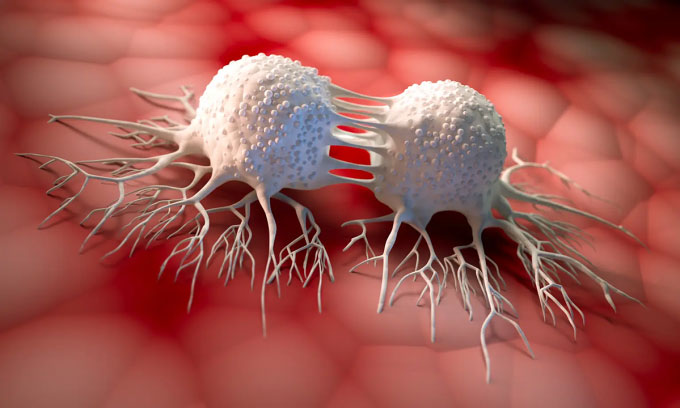Macrophages could become 'weapons' to kill cancer
Macrophages may be the key in the fight against cancer, eating inflammatory cells and destroying emerging cancer cells.
For a long time, scientists have not been able to answer one of the biggest questions about cancer: "Why does the disease almost exclusively target middle-aged and elderly people?" In the first years of life, a person is twice as likely to die from a car accident as from cancer. However, the number changes dramatically when they enter middle age. "Inflammation leads to cancer, 90% of cancers appear after age 50," said Dr. James DeGregori, deputy director of the University of Colorado Cancer Center.
Many theories have been put forward as to why the body can no longer fight cancer after age 50. Some believe that cell damage accumulates, while others believe that the immune system loses some of its strength. However, research in recent years has found that another culprit that promotes cancer is inflammation, and more specifically, inflammatory agents.
"This is a newly investigated factor in aging that contributes to increased cancer risk in older adults ," said Dr. Brian Brown, director of the Icahn Genomics Institute at Mount Sinai University.
Inflammation is essentially a good thing, part of the immune response, the reason why people don't get infections. When the body is healthy, the immune system can fight off infections and eliminate cancer cells, then shut down on its own. But this changes as people age. After age 40, the body has difficulty reducing inflammation. Chronic inflammation keeps the immune system on high alert, making it less able to detect and attack cancer cells effectively.

Illustration of cancer cells multiplying in the body. (Photo: Adobe Stock)
The key to fighting cancer may be macrophages
One of the most promising studies on inflammation and cancer involves macrophages. These are white blood cells that play an important role in the immune system, protecting the body from pathogens.
Recent studies have shown that cancer produces more macrophages, which suppress inflammation and promote tumor growth. Finding ways to control and redirect macrophages could have profound implications for cancer and even aging.
Yara Abdou, an associate professor of oncology at the University of North Carolina, discovered a way to 'trick macrophages into thinking that cancer is a foreign invader.' They engineered macrophages to recognize cancer targets. When the macrophages encountered the tumor, they ingested cancer cells and inflammatory cells within the tumor, allowing the patient's immune cells to attack the cancer.
The researchers' research is still in its early stages, but the results are "very promising." "We have generated macrophages from patients with advanced cancer. After just one dose of macrophages, the malignant lesion has shrunk," said Associate Professor Abdou.
The researchers' research, which focused on patients with breast, ovarian, and esophageal cancers, could be extended to other cancers. Dr. Brown said there is a connection between aging and inflammation. Understanding the role of inflammation in aging-related diseases in general could not only be effective in fighting cancer, but could also help treat heart disease, Alzheimer's, and arthritis.
- Can we kill cancer cells when they're sleeping?
- Top 14 most dangerous cancers today
- Test virus 'kill cancer cells'
- Breakthrough kill metastatic cancer cells
- Found a way to kill 99% of cancer cells
- Ladybug is 'biological weapon' in the supermarket
- Singapore discovered how to kill new cancer cells
- 8 foods help kill cancer cells
- Russian and Swedish scientists have found a way to kill cancer cells
- Develop nanotechnology to kill cancer cells
- Discover how to destroy cancer cell structure
- New treatment for liver cancer patients
 Why is Australia the country with the highest cancer rate in the world while Vietnam ranks 100th?
Why is Australia the country with the highest cancer rate in the world while Vietnam ranks 100th? New drug causes cancer to 'starve'
New drug causes cancer to 'starve' Common cancers in men
Common cancers in men America's incredible discovery: The most feared cancer cell is love
America's incredible discovery: The most feared cancer cell is love